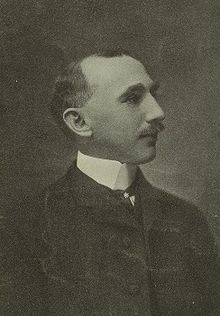Madison Cawein
poet from Louisville, Kentucky
Madison Julius Cawein (23 March 1865 – 8 December 1914) was a poet from Louisville, Kentucky, whose poem "Waste Land" has been linked with T.S. Eliot's later The Waste Land.

Quotes
edit- When the hornet hangs in the hollyhock,
And the brown bee drones i' the rose,
And the west is a red-streaked four-o'-clock
And summer is near its close—
It's—Oh for the gate and the lotus lane
And dusk and dew and home again!- "In the Lane", stanza 1, in A Voice on the Wind (Louisville: John P. Morton & Company, 1902), p. 44.
- A rope, a prayer, and an oak-tree near,
And a score of hands to swing him clear.
A grim, black thing for the setting sun
And the moon and the stars to look upon.- "The Man Hunt", line 33, in The Vale of Tempe (New York: E. P. Dutton and Company, 1905), p. 76.
- I am a part of all you see
In Nature; part of all you feel:
I am the impact of the bee
Upon the blossom; in the tree
I am the sap,—that shall reveal
The leaf, the bloom,—that flows and flutes
Up from the darkness through its roots.- "Penetralia", line 1, in The Vale of Tempe (New York: E. P. Dutton and Company, 1905), p. 133.
- This is the truth as I see it, my dear,
Out in the wind and the rain:
They who have nothing have little to fear,—
Nothing to lose or to gain.- "At the End of the Road", line 1, in The Cup of Comus (New York: The Cameo Press, 1915), p. 20.
Undertones (1896)
edit- Undertones (Boston: Copeland and Day, 1896)
- At daybreak Morn shall come to me
In raiment of the white winds spun.- "Quiet", line 4, p. 2.
- A moonlight traveler in Fancy’s land.
- "Unencouraged Aspiration", line 3, p. 3.
- Some shall reap that never sow;
And some shall toil and not attain.- "Success", line 6, p. 7.
- Into the sunset’s turquoise marge
The moon dips, like a pearly barge;
Enchantment sails through magic seas,
To fairyland Hesperides,
Over the hills and away.- "At Sunset", stanza 1, p. 16.
- What magic shall solve us the secret
Of beauty that’s born for an hour?- "Interpreted", line 1, p. 19.
- Though sands be black and bitter black the sea,
Light lie before me and behind me night,
And God within far Heaven refuse to light
The consolation of the dawn for me,—
Between the shadowy bournes of Heaven and Hell,
It is enough love leaves my soul to dwell
With Memory.- "Monochromes", Part II, stanza 3, p. 34.
Myth and Romance (1899)
edit- Myth and Romance (New York and London: G. P. Putnam's Sons, 1899)
- Why will we struggle to attain, and strive
When all we gain is but an empty dream?—
Better, unto my thinking, doth it seem
To end it all and let who will survive;To find at last all beauty is but dust;
That love and sorrow are the very same;
That joy is only suffering's sweeter name;
And sense is but the synonym of lust.Far better, yea, it seems to me to die;
To set glad lips against the lips of Death—
The only thing God gives that comforteth,
The only thing we do not find a lie.- "The Land of Illusion", concluding stanzas (XIX–XXI), p. 49.
- When death hath poured oblivion through my veins
And brought me home, as all are brought, to lie
In that vast house, common to serfs and thanes,—
I shall not die, I shall not utterly die,
For beauty born of beauty—that remains.- "To a Wind-Flower", line 14, p. 53.
- Old homes! old hearts! Upon my soul forever
Their peace and gladness lie like tears and laughter.- "Old Homes", line 21, p. 59.
New Poems (1909)
edit- New Poems (London: Grant Richards, 1909)
- Again let us dream where the land lies sunny,
And live, like the bees, on our hearts' old honey,
Away from the world that slaves for money—
Come, journey the way with me.- "A Song of the Road", line 5, p. 102.
- There are haunters of the silence, ghosts that hold the heart and brain.
- "Haunters of the Silence", line 1, p. 131.
- Some reckon time by stars,
And some by hours:
Some measure days by dreams,
And some by flowers:
My heart alone records
My days and hours.- "Some reckon time by stars", stanza 1, p. 143.